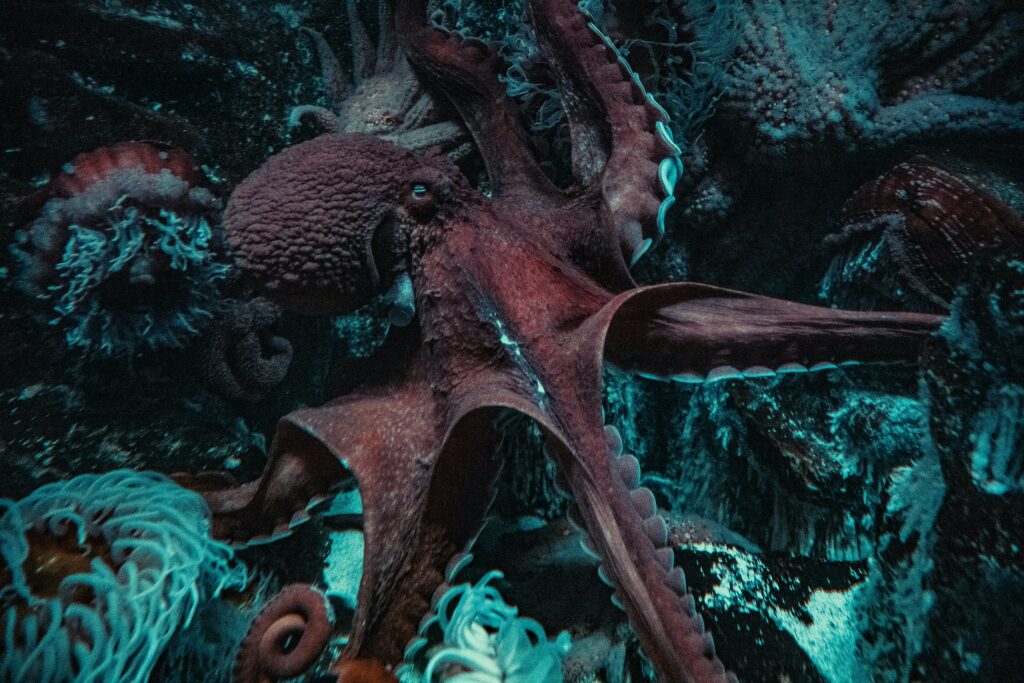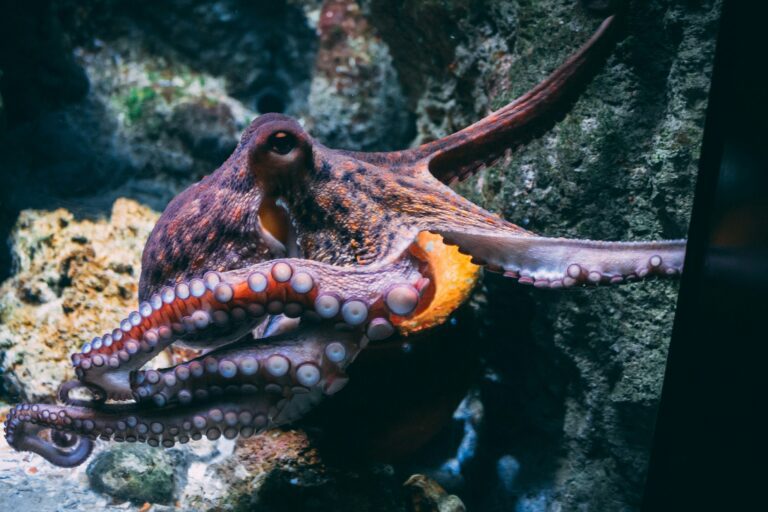Octopuses, with their mesmerizing movements and mysterious aura, have long captured the curiosity of scientists and the public alike. Beyond their striking appearance, these creatures possess a remarkable intelligence that rivals that of many vertebrates. In this blog post, we delve into the secret lives of octopuses, exploring the depths of their intellect and problem-solving abilities.
Understanding Octopus Intelligence
Adaptability in the Wild
Octopuses are renowned for their remarkable adaptability in the wild. With their soft bodies, eight flexible arms, and highly developed nervous systems, they have evolved to thrive in diverse marine environments around the world. One key aspect of their adaptability is their ability to camouflage themselves to blend seamlessly into their surroundings, using specialized skin cells called chromatophores, which allow them to change color and texture. This camouflage helps them evade predators and ambush prey, showcasing their incredible survival skills.
Apart from camouflage, octopuses demonstrate adaptability through their hunting techniques. They exhibit a wide range of hunting strategies, from stealthily stalking their prey to employing ingenious tactics such as mimicry to deceive their victims. This adaptability in hunting methods enables them to capitalize on various ecological niches and food sources, ensuring their survival even in challenging environments.
Furthermore, octopuses are capable of adjusting their behavior in response to changing environmental conditions. Whether it’s finding shelter during turbulent weather or seeking out cooler waters during temperature spikes, these cephalopods display a remarkable ability to adapt and thrive in ever-changing oceanic habitats.
Learning and Memory Capabilities
The intelligence of octopuses extends to their impressive learning and memory capabilities. Despite lacking a centralized brain like vertebrates, these creatures possess complex nervous systems with large numbers of neurons distributed throughout their bodies, allowing for sophisticated cognitive functions.
Octopuses exhibit remarkable learning abilities through both observational learning and trial-and-error experimentation. They can quickly learn from watching conspecifics or other animals, adapting their behaviors accordingly. Additionally, octopuses show remarkable problem-solving skills, often figuring out how to manipulate objects or navigate through mazes to obtain rewards.
Their ability to retain information over extended periods suggests a significant capacity for memory. Octopuses have been observed remembering past experiences and using that information to inform their future actions. This long-term memory aids them in navigating their environments, recognizing familiar individuals, and even recalling the locations of food sources.
Complex Problem-Solving Skills
One of the most fascinating aspects of octopus intelligence is their complex problem-solving skills. In controlled laboratory settings, octopuses have been presented with various puzzles and challenges, which they often solve with remarkable efficiency and creativity.
These cephalopods demonstrate an ability to think critically and adapt their strategies to overcome obstacles. Whether it’s opening jars to access hidden food or navigating through intricate labyrinths, octopuses showcase a level of problem-solving prowess that rivals some vertebrate species.
Their problem-solving abilities are not limited to simple tasks; octopuses have been known to exhibit tool usage in the wild, utilizing objects such as coconut shells for shelter or as defensive barriers. This demonstrates their capacity for innovation and adaptability when faced with novel situations.
The Enigmatic Nature of Octopus Problem Solving
Examples of Octopus Problem-Solving Behaviors
Octopuses are renowned for their enigmatic problem-solving abilities, which often defy traditional expectations of invertebrate intelligence. One remarkable example of octopus problem-solving behavior involves their adeptness at escaping from enclosures. In laboratory settings, researchers have observed octopuses utilizing their flexible bodies and strong arms to manipulate locks, unscrew lids, and even squeeze through impossibly small openings to gain freedom. These feats of escape demonstrate not only the octopus’s physical dexterity but also its capacity for strategic thinking and perseverance in the face of challenges.
Another intriguing example of octopus problem-solving behavior is their use of tools in the wild. In one documented case, an octopus was observed carrying coconut shells and assembling them into a makeshift shelter. By employing these shells as protective cover, the octopus was able to evade predators and create a safe space for resting and foraging. This demonstration of tool usage highlights the octopus’s ability to innovate and adapt its environment to suit its needs, showcasing a level of cognitive sophistication previously thought to be exclusive to certain vertebrate species.
Furthermore, octopuses exhibit problem-solving skills in their hunting strategies. From using jets of water to flush out hidden prey to employing diversion tactics to distract potential predators, these cephalopods display a keen understanding of their ecosystem and the behaviors of other marine organisms. Their ability to devise and execute complex hunting maneuvers demonstrates a level of strategic thinking and foresight that belies their invertebrate status.
Observations from Research Studies
Research studies focusing on octopus problem-solving behavior have provided valuable insights into the cognitive abilities of these fascinating creatures. In controlled laboratory experiments, octopuses have been presented with various puzzles and challenges, ranging from simple mazes to intricate mechanical devices. In many cases, octopuses have successfully navigated these obstacles, often employing creative solutions that surprise researchers and challenge preconceived notions about invertebrate intelligence.
One notable research study involved presenting octopuses with jars containing food rewards that were sealed with different types of lids, such as screw caps or child-proof locks. Despite never encountering such objects in their natural habitat, the octopuses quickly learned to unscrew the lids or manipulate the locks to access the food inside. This ability to adapt to novel situations and solve problems through trial-and-error learning suggests a high degree of cognitive flexibility and problem-solving acumen in octopuses.
Overall, the observations from research studies highlight the enigmatic nature of octopus problem-solving behavior and underscore the need for further investigation into the cognitive abilities of these remarkable creatures. Through their ingenious problem-solving strategies, octopuses continue to captivate and inspire scientists, challenging our understanding of intelligence and cognition in the animal kingdom.

Implications and Applications
Insights for Understanding Animal Cognition
Studying octopus intelligence offers valuable insights into the broader field of animal cognition. By unraveling the intricacies of octopus problem-solving abilities, researchers gain a deeper understanding of the diversity of cognitive processes present in the animal kingdom. Octopuses challenge traditional notions of intelligence, prompting scientists to reconsider what it means to be a highly cognitive organism. Insights gained from studying octopus cognition can inform research in comparative psychology and ethology, shedding light on the evolution of intelligence and cognition across different species.
Moreover, understanding octopus cognition has implications for animal welfare and conservation efforts. Recognizing the cognitive complexity of octopuses underscores the need for ethical treatment and consideration of their welfare in captivity and in the wild. By acknowledging their cognitive abilities, researchers and policymakers can advocate for the protection of octopus populations and the preservation of their habitats, ensuring the well-being of these fascinating creatures for generations to come.
Inspiration for Technology and Engineering
The remarkable problem-solving abilities of octopuses have inspired researchers in the fields of technology and engineering to develop innovative solutions and technologies. The soft-bodied nature of octopuses, coupled with their extraordinary flexibility and dexterity, has served as a blueprint for designing soft robotics and robotic manipulators capable of navigating complex environments with agility and precision.
By mimicking the biomechanics and locomotion strategies of octopuses, engineers have developed soft robots that can squeeze through tight spaces, manipulate objects with finesse, and adapt to changing environmental conditions. These bio-inspired robots hold great promise for applications in areas such as search and rescue operations, underwater exploration, and minimally invasive medical procedures.
Furthermore, insights gleaned from studying octopus camouflage mechanisms have led to advancements in adaptive camouflage technologies for military and civilian applications. By understanding how octopuses change color and texture to blend seamlessly into their surroundings, researchers are developing materials and coatings that can mimic this adaptive camouflage, offering enhanced concealment and protection in various contexts.
Incorporating principles of octopus intelligence into technology and engineering not only pushes the boundaries of innovation but also fosters interdisciplinary collaboration between biology, robotics, and materials science. As researchers continue to uncover the mysteries of octopus cognition, the potential for transformative applications in technology and engineering remains vast and exciting.
VIDEO CREDITS OCTOLAB TV
FAQs
Q. What are some fascinating aspects of octopus intelligence?
A. Octopuses are known for their exceptional problem-solving abilities, demonstrated through various experiments. They can navigate mazes, unscrew jars to access food, and even mimic other creatures.
Q. How do octopuses display their problem-solving skills in the wild?
A. In the wild, octopuses exhibit ingenious hunting techniques, such as using coconut shells as portable shelters or disguising themselves with rocks and shells to evade predators.
Q. How do octopuses learn and adapt to their environment?
A. Octopuses have a remarkable ability to learn from experience and adapt their behaviors accordingly. They can memorize complex routes, recognize individuals, and quickly adjust their strategies to new challenges.
Q. What is the significance of studying octopus intelligence?
A. Understanding octopus intelligence not only sheds light on the evolution of cognitive abilities but also inspires advancements in fields like robotics and artificial intelligence.
Q. How do octopuses compare to other intelligent animals, like dolphins or apes?
A. While octopuses exhibit intelligence in unique ways, they are often compared to dolphins and apes in terms of problem-solving skills and cognitive flexibility. However, each species has its own distinct behaviors and adaptations.
Conclusion
As we journey into the secret lives of octopuses, we are reminded of the boundless wonders of the natural world. From their astounding intelligence to their ingenious problem-solving skills, these creatures continue to captivate and inspire us with their remarkable abilities.
By delving deeper into the mysteries of octopus cognition, we not only gain a greater appreciation for these fascinating creatures but also unlock valuable insights into the complexities of the animal mind. As we continue to explore the depths of the ocean and unravel the secrets of octopus intelligence, one thing is clear: the world of cephalopods holds endless surprises and discoveries waiting to be uncovered.
UP NEXT
Exploring the Mysterious Lives of Whales: Migration Patterns



